The global smart implants market is projected to grow from USD 2.6 billion in 2025 to approximately USD 7.8 billion by 2035, recording an absolute increase of USD 5.2 billion over the forecast period. This translates into a total growth of 199.7%, with the market forecast to expand at a compound annual growth rate (CAGR) of 11.6% between 2025 and 2035. The overall market size is expected to grow by nearly 3.00X during the same period, supported by increasing prevalence of chronic diseases, rising adoption of minimally invasive surgical procedures, and growing demand for remote patient monitoring and connected healthcare solutions.
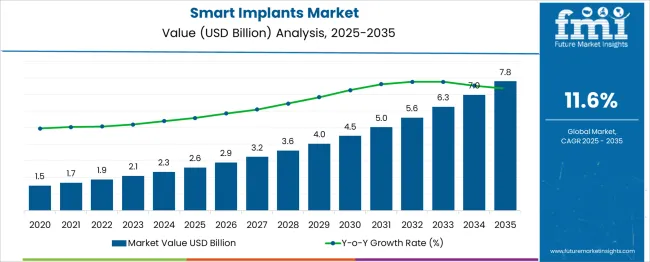
Between 2025 and 2030, the smart implants market is projected to expand from USD 2.6 billion to USD 4.9 billion, resulting in a value increase of USD 2.3 billion, which represents 44.2% of the total forecast growth for the decade. This phase of development will be shaped by the rising prevalence of cardiovascular and neurological disorders, the increasing adoption of IoT-enabled medical devices, and the growing penetration of digital health technologies in surgical and post-operative care. Medical device manufacturers are expanding their smart implant product portfolios to address the increasing demand for connected healthcare solutions and real-time patient monitoring capabilities.
| Metric | Value |
|---|---|
| Estimated Value in (2025E) | USD 2.6 billion |
| Forecast Value in (2035F) | USD 7.8 billion |
| Forecast CAGR (2025 to 2035) | 11.6% |
From 2030 to 2035, the market is forecast to grow from USD 4.9 billion to USD 7.8 billion, adding another USD 2.9 billion, which constitutes 55.8% of the overall ten-year expansion. This period is expected to be characterized by the expansion of artificial intelligence integration in implant technologies, the development of next-generation biosensors and wireless communication capabilities, and the advancement of personalized implant solutions based on patient-specific data analytics. The growing adoption of telemedicine and remote patient monitoring will drive demand for smart implants with enhanced connectivity and real-time health data transmission capabilities.
Between 2020 and 2025, the smart implants market experienced significant acceleration, driven by increased focus on connected healthcare solutions and growing recognition of the benefits of continuous patient monitoring through implantable devices. The market developed as healthcare providers recognized the potential for smart implants to improve patient outcomes while reducing healthcare costs through early intervention and remote monitoring capabilities. Digital health transformation and IoT adoption in medical devices have begun to focus on the critical role of smart implants in personalized medicine and precision healthcare delivery.
Market expansion is being supported by the increasing prevalence of chronic diseases and the corresponding demand for advanced medical devices that can provide continuous monitoring and therapeutic intervention. Modern healthcare systems are increasingly focused on preventive care and early intervention strategies that can improve patient outcomes while reducing long-term healthcare costs. Smart implants' proven ability to monitor vital parameters, deliver targeted therapy, and enable real-time communication with healthcare providers makes them essential components of advanced medical care and chronic disease management.
The growing focus on personalized medicine and precision healthcare is driving demand for smart implants that can adapt to individual patient needs and provide customized therapeutic responses. Healthcare providers' preference for devices that combine therapeutic functionality with data collection and transmission capabilities is creating opportunities for innovative smart implant implementations. The rising influence of artificial intelligence and machine learning in medical devices is also contributing to increased adoption of smart implants that can provide predictive analytics and automated therapeutic adjustments.
The market is segmented by implant type, surgery, end use, and region. By implant type, the market is divided into cardiovascular implants, orthopedic implants, neurostimulation implants, and others. Based on the type of surgery, the market is categorized into open surgery and minimally invasive surgery. In terms of end use, the market is segmented into hospitals, cardiac care centers, ambulatory surgical centers, and other end uses. Regionally, the market is divided into North America, Europe, East Asia, South Asia & Pacific, Latin America, and the Middle East & Africa.
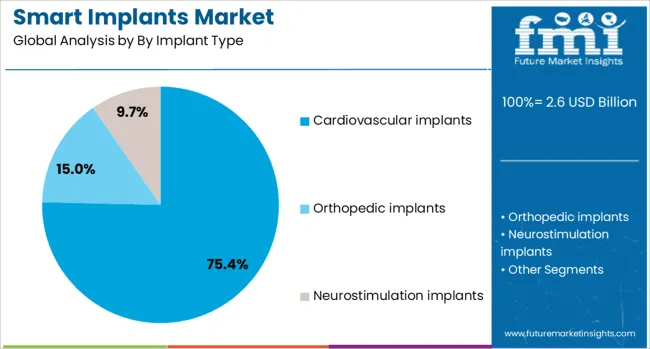
The cardiovascular implants segment is projected to account for 75.4% of the smart implants market in 2025, reaffirming its position as the dominant implant category. Healthcare providers increasingly prefer smart cardiovascular implants for their ability to monitor heart rhythm, detect arrhythmias, and provide real-time cardiac function data that can guide treatment decisions and prevent cardiovascular events. Smart cardiovascular implants' proven effectiveness in improving patient outcomes while reducing hospital readmissions directly addresses healthcare system needs for cost-effective chronic disease management and preventive care.
This implant type forms the foundation of most smart implant applications, as it represents the most mature and clinically validated technology in the connected medical device ecosystem. Investments by manufacturers in advanced cardiac monitoring technologies and the ongoing development of AI-powered diagnostic algorithms continue to strengthen market adoption. With healthcare providers prioritizing patient outcomes and cost reduction, smart cardiovascular implants align with both clinical efficacy requirements and healthcare economic objectives, making them the central driver of smart implant market growth.
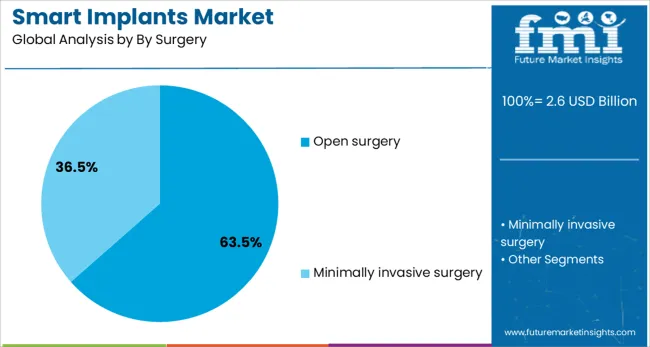
Open surgery is projected to represent 63.5% of smart implant procedures in 2025, underscoring its continued importance in complex implant placement and device integration. Healthcare providers prefer open surgery approaches for smart implant procedures that require precise positioning, comprehensive visualization, and secure device anchoring for optimal long-term performance. Positioned as the standard approach for complex cardiovascular and neurostimulation implant procedures, open surgery offers both surgical precision benefits and enhanced device placement accuracy.
The segment is supported by established surgical protocols and surgeon expertise in open implant procedures that ensure proper device positioning and optimal patient outcomes. The open surgery approaches enable comprehensive evaluation of surrounding tissue and precise device calibration during implantation procedures. As healthcare providers prioritize device performance and patient safety, open surgery will continue to dominate smart implant procedures while supporting reliable device functionality and optimal therapeutic outcomes.
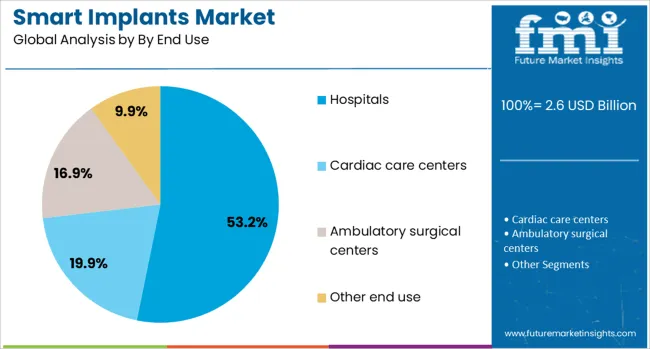
The hospital's end-use segment is forecasted to contribute 53.2% of the smart implants market in 2025, reflecting the primary role of hospital systems in complex implant procedures and post-operative care management. Hospital healthcare providers increasingly utilize smart implants to enhance patient monitoring capabilities while providing comprehensive care coordination and device management services. This aligns with hospital-based care delivery models that focusing on advanced technology integration and specialized medical device expertise.
The segment benefits from established hospital infrastructure and healthcare provider expertise in managing complex medical devices and patient monitoring systems. With comprehensive surgical capabilities and specialized cardiac and neurological care units, hospitals serve as the primary setting for smart implant procedures and ongoing device management, making them a critical foundation for market growth and the adoption of advanced medical device technologies.
The smart implants market is advancing rapidly due to the increasing prevalence of chronic diseases and the growing demand for connected healthcare solutions that enable remote patient monitoring and personalized therapy. The market faces challenges, including high device costs, complex regulatory approval processes, and concerns about data security and device cybersecurity. Innovation in wireless communication technologies and artificial intelligence integration continues to influence product development and market expansion patterns.
The growing adoption of Internet of Things (IoT) technologies in healthcare is enabling smart implants to integrate with comprehensive healthcare ecosystems that provide real-time monitoring, predictive analytics, and automated therapeutic adjustments. Connected smart implants offer enhanced patient management capabilities while supporting healthcare providers with continuous data streams and early warning systems. Healthcare systems are increasingly recognizing the value of connected medical devices in improving patient outcomes and reducing healthcare costs.
Modern smart implant manufacturers are incorporating advanced AI and machine learning capabilities to enable predictive diagnostics, automated therapy optimization, and personalized treatment algorithms. These technologies improve patient outcomes while providing healthcare providers with sophisticated decision support tools and predictive analytics capabilities. Advanced AI integration also enables smart implants to learn from patient responses and continuously optimize therapeutic delivery for individual patient needs.
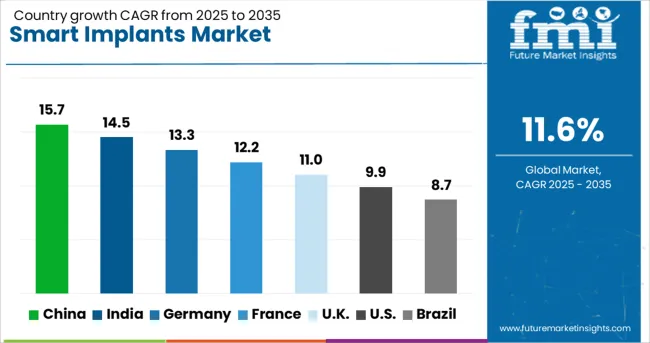
| Country | CAGR (2025-2035) |
|---|---|
| China | 15.7% |
| India | 14.5% |
| Germany | 13.3% |
| France | 12.2% |
| UK | 11.0% |
| USA | 9.9% |
| Brazil | 8.7% |
The smart implants market is experiencing exceptional growth globally, with China leading at a 15.7% CAGR through 2035, driven by massive healthcare infrastructure investment, a rapidly aging population, and increasing adoption of advanced medical technologies. India follows closely at 14.5%, supported by expanding healthcare access, growing medical device manufacturing, and rising prevalence of chronic diseases requiring implantable device therapy. Germany shows strong growth at 13.3%, focusing on medical device innovation and precision healthcare delivery. France records 12.2%, focusing on healthcare technology integration and advanced cardiac care. The UK shows 11.0% growth, prioritizing digital health innovation and connected medical devices.
The report covers an in-depth analysis of 40+ countries; seven top-performing countries are highlighted below.
Revenue from smart implants in China is projected to exhibit exceptional growth with a CAGR of 15.7% through 2035, driven by massive healthcare infrastructure investment and a rapidly growing elderly population requiring advanced cardiac and neurological care. The country's expanding medical device industry and increasing focus on digital health technologies are creating significant demand for smart implant solutions. Major international medical device companies and domestic manufacturers are establishing comprehensive research and production capabilities to serve the growing healthcare market.
Revenue from smart implants in India is expanding at a CAGR of 14.5%, supported by rapidly expanding healthcare infrastructure, growing medical tourism, and increasing prevalence of cardiovascular and neurological disorders requiring implantable device therapy. The country's developing medical device manufacturing sector and rising healthcare investment are driving demand for advanced smart implant technologies. International medical device companies and domestic manufacturers are establishing comprehensive service networks to address the growing demand for connected healthcare solutions.
Demand for smart implants in Germany is projected to grow at a CAGR of 13.3%, supported by the country's leadership in medical device technology and strong focusing on precision healthcare delivery and patient outcomes. German healthcare providers consistently demand high-performance smart implants that meet stringent quality requirements and provide superior therapeutic efficacy with advanced monitoring capabilities.
Revenue from smart implants in France is projected to grow at a CAGR of 12.2% through 2035, driven by the country's advanced healthcare system and focus on medical technology integration and patient care innovation. French healthcare providers consistently demand high-quality smart implant solutions that deliver superior therapeutic outcomes while supporting advanced patient monitoring and care coordination.
Revenue from smart implants in the UK is projected to grow at a CAGR of 11.0% through 2035, supported by a strong focusig on digital health innovation and connected healthcare technology adoption across NHS and private healthcare systems. British healthcare providers value advanced technology integration, patient outcomes, and proven clinical efficacy, positioning smart implants as essential components of modern medical care delivery.
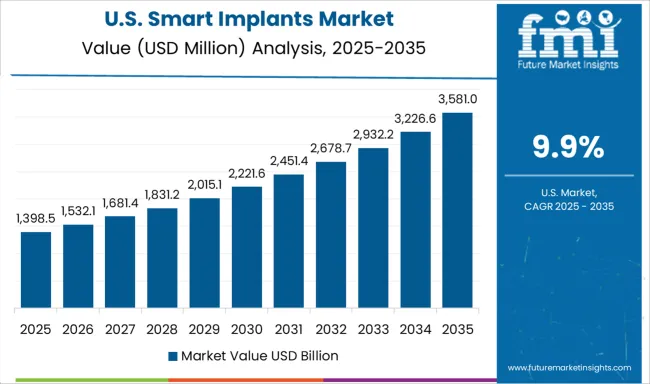
Revenue from smart implants in the USA is projected to grow at a CAGR of 9.9% through 2035, supported by the country's leadership in medical device innovation, advanced healthcare infrastructure, and preference for cutting-edge therapeutic technologies. American healthcare providers prioritize clinical efficacy, technological advancement, and patient outcomes, making advanced smart implants a preferred choice in cardiovascular, orthopedic, and neurological care applications.
Revenue from smart implants in Brazil is projected to grow at a CAGR of 8.7% through 2035, supported by expanding healthcare infrastructure, growing prevalence of chronic diseases, and increasing adoption of advanced medical technologies in healthcare delivery. The country's developing medical device market and rising healthcare investment are creating significant opportunities for smart implant adoption. International medical device companies and domestic distributors are establishing comprehensive service capabilities to serve the growing demand for advanced medical device solutions.
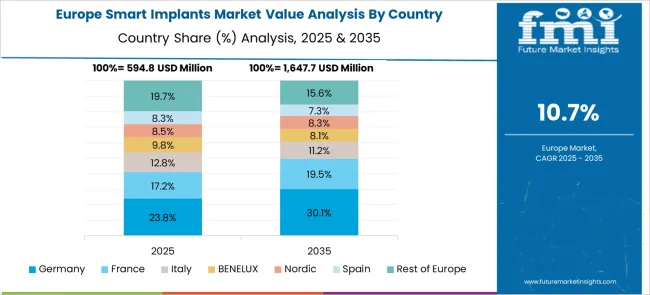
The smart implants market in Europe demonstrates advanced development across major economies, with Germany showing a strong presence through its medical device industry expertise and focusing on precision engineering in healthcare technology, supported by manufacturers leveraging engineering excellence to develop high-performance smart implants that focusing on reliability, precision, and advanced connectivity for cardiovascular and neurological applications.
France represents a significant market driven by its healthcare system innovation and sophisticated understanding of medical technology integration, with companies focusing on advanced smart implant solutions that combine French medical expertise with cutting-edge sensor technologies for enhanced patient monitoring and therapeutic delivery in hospital and specialized care settings.
The UK exhibits considerable growth through its focus on healthcare innovation and digital health technology adoption, with strong utilization of smart implants in NHS facilities, private hospitals, and specialized cardiac centers. Germany and France are showing increasing interest in AI-powered smart implant applications, particularly in predictive healthcare and personalized therapy optimization. BENELUX countries contribute through their focus on healthcare technology innovation and premium medical device adoption. At the same time, Eastern Europe and Nordic regions display growing potential driven by increasing healthcare investment and expanding access to advanced medical technologies.
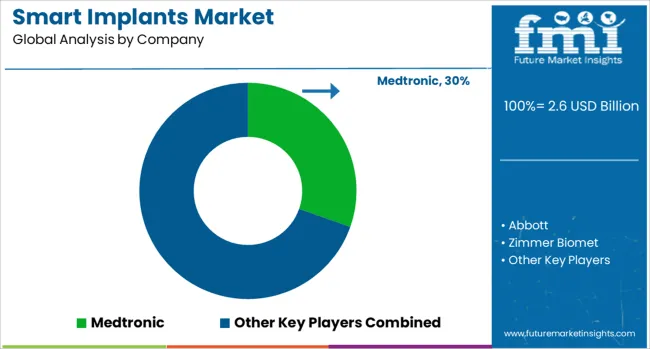
The smart implants market is characterized by competition among established medical device manufacturers, specialized implantable device companies, and emerging digital health technology providers. Companies are investing in advanced sensor technologies, wireless communication capabilities, artificial intelligence integration, and comprehensive clinical support services to deliver safe, effective, and connected smart implant solutions. Innovation in device miniaturization, battery technology, and biocompatibility is central to strengthening market position and clinical adoption.
Medtronic leads the market with significant global market share, offering comprehensive smart implant solutions with a focus on cardiovascular and neurostimulation applications and advanced device connectivity. Abbott provides innovative medical device technologies with an focuses on cardiac monitoring and therapeutic delivery systems. Zimmer Biomet delivers orthopedic implant solutions with a focus on smart joint replacement and bone healing technologies. Biotronik specializes in cardiac rhythm management with focuses on remote monitoring and connected device capabilities.
Boston Scientific focuses on minimally invasive medical devices with an focuses on smart therapeutic delivery and patient monitoring. DirectSync Surgical provides specialized implant technologies with a focus on orthopedic applications. Intelligent Implants offers smart orthopedic solutions with focuses on bone healing monitoring and therapy optimization. NeuroPace specializes in neurostimulation implants with a focus on epilepsy management and brain monitoring technologies.
| Items | Values |
|---|---|
| Quantitative Units (2025) | USD 2.6 billion |
| Implant Type | Cardiovascular implants, Orthopedic implants, Neurostimulation implants |
| Surgery | Open surgery, Minimally invasive surgery |
| End Use | Hospitals, Cardiac care centers, Ambulatory surgical centers, Other end use |
| Regions Covered | North America, Europe, East Asia, South Asia & Pacific, Latin America, Middle East & Africa |
| Countries Covered | United States, Canada, United Kingdom, Germany, France, China, Japan, South Korea, India, Brazil, Australia and 40+ countries |
| Key Companies Profiled | Medtronic, Abbott, Zimmer Biomet, Biotronik, Boston Scientific, DirectSync Surgical, Intelligent Implants, and NeuroPace |
| Additional Attributes | Dollar sales by implant type and end use category, regional demand trends, competitive landscape, buyer preferences for open versus minimally invasive procedures, integration with digital health platforms, innovations in sensor technology, wireless communication advancement, and AI-powered diagnostic solution development |
The global smart implants market is estimated to be valued at USD 2.6 billion in 2025.
The market size for the smart implants market is projected to reach USD 7.8 billion by 2035.
The smart implants market is expected to grow at a 11.6% CAGR between 2025 and 2035.
The key product types in smart implants market are cardiovascular implants, orthopedic implants and neurostimulation implants.
In terms of by surgery, open surgery segment to command 63.5% share in the smart implants market in 2025.






Our Research Products

The "Full Research Suite" delivers actionable market intel, deep dives on markets or technologies, so clients act faster, cut risk, and unlock growth.

The Leaderboard benchmarks and ranks top vendors, classifying them as Established Leaders, Leading Challengers, or Disruptors & Challengers.

Locates where complements amplify value and substitutes erode it, forecasting net impact by horizon

We deliver granular, decision-grade intel: market sizing, 5-year forecasts, pricing, adoption, usage, revenue, and operational KPIs—plus competitor tracking, regulation, and value chains—across 60 countries broadly.

Spot the shifts before they hit your P&L. We track inflection points, adoption curves, pricing moves, and ecosystem plays to show where demand is heading, why it is changing, and what to do next across high-growth markets and disruptive tech

Real-time reads of user behavior. We track shifting priorities, perceptions of today’s and next-gen services, and provider experience, then pace how fast tech moves from trial to adoption, blending buyer, consumer, and channel inputs with social signals (#WhySwitch, #UX).

Partner with our analyst team to build a custom report designed around your business priorities. From analysing market trends to assessing competitors or crafting bespoke datasets, we tailor insights to your needs.
Supplier Intelligence
Discovery & Profiling
Capacity & Footprint
Performance & Risk
Compliance & Governance
Commercial Readiness
Who Supplies Whom
Scorecards & Shortlists
Playbooks & Docs
Category Intelligence
Definition & Scope
Demand & Use Cases
Cost Drivers
Market Structure
Supply Chain Map
Trade & Policy
Operating Norms
Deliverables
Buyer Intelligence
Account Basics
Spend & Scope
Procurement Model
Vendor Requirements
Terms & Policies
Entry Strategy
Pain Points & Triggers
Outputs
Pricing Analysis
Benchmarks
Trends
Should-Cost
Indexation
Landed Cost
Commercial Terms
Deliverables
Brand Analysis
Positioning & Value Prop
Share & Presence
Customer Evidence
Go-to-Market
Digital & Reputation
Compliance & Trust
KPIs & Gaps
Outputs
Full Research Suite comprises of:
Market outlook & trends analysis
Interviews & case studies
Strategic recommendations
Vendor profiles & capabilities analysis
5-year forecasts
8 regions and 60+ country-level data splits
Market segment data splits
12 months of continuous data updates
DELIVERED AS:
PDF EXCEL ONLINE
Smart Orthopedic Implants Market
Smart School Bus Platform Market Size and Share Forecast Outlook 2025 to 2035
Smart Home Wireless Smoke Detector Market Size and Share Forecast Outlook 2025 to 2035
Smart Bus Platform Market Size and Share Forecast Outlook 2025 to 2035
Smart Vision Processing Chips Market Size and Share Forecast Outlook 2025 to 2035
Smart Touch Screen Scale Market Size and Share Forecast Outlook 2025 to 2035
Smart Magnetic Drive Conveyor System Market Size and Share Forecast Outlook 2025 to 2035
Smart Wheelchair market Size and Share Forecast Outlook 2025 to 2035
Smart Mining Technologies Market Size and Share Forecast Outlook 2025 to 2035
Smart Parking Market Size and Share Forecast Outlook 2025 to 2035
Smart Digital Valve Positioner Market Forecast and Outlook 2025 to 2035
Smart Card IC Market Size and Share Forecast Outlook 2025 to 2035
Smart-Tag Inlay Inserters Market Analysis - Size and Share Forecast Outlook 2025 to 2035
Smart TV Market Forecast and Outlook 2025 to 2035
Smart/AI Toy Market Size and Share Forecast Outlook 2025 to 2035
Smart Locks Market Size and Share Forecast Outlook 2025 to 2035
Smart Sprinkler Controller Market Size and Share Forecast Outlook 2025 to 2035
Smart Indoor Gardening System Market Size and Share Forecast Outlook 2025 to 2035
Smart Building Delivery Robot Market Size and Share Forecast Outlook 2025 to 2035
Smart Watch Market Size and Share Forecast Outlook 2025 to 2035

Thank you!
You will receive an email from our Business Development Manager. Please be sure to check your SPAM/JUNK folder too.
Chat With
MaRIA